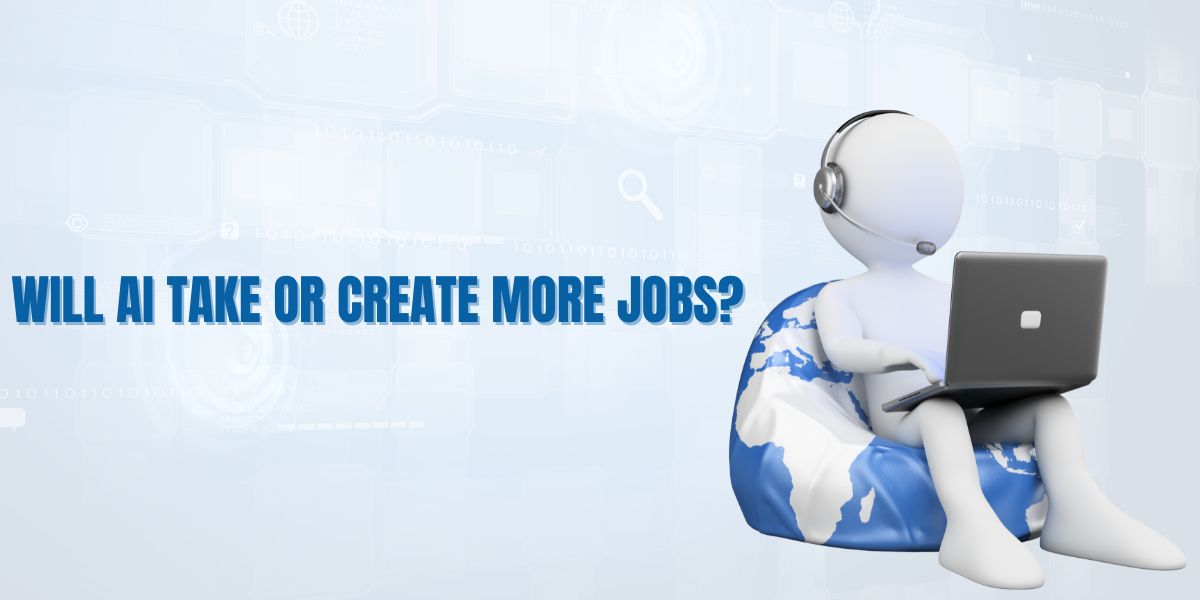Artificial Intelligence (AI) is a popular subject right now, sparking curiosity about its impact on the job market—will AI take away jobs or help create new ones? The rapid growth of AI is transforming various industries, prompting concerns and speculations about its effect on employment. As AI becomes more prevalent, it raises important questions about whether it will primarily displace workers or foster new economic opportunities. AI, which enables machines to learn and make decisions like humans, is utilized in fields like healthcare, finance, customer service, digital marketing, and web development. Some worry that AI might replace human workers due to its ability to perform certain tasks faster and more accurately. For instance, in factories, AI-powered robots can assemble products more efficiently than people. Similarly, in digital marketing, AI can analyze vast amounts of data to optimize campaigns, potentially reducing the need for human analysts. In web development, AI can assist in coding and debugging, streamlining the development process. On the other hand, AI also has the potential to create new jobs, as the development and maintenance of AI systems require roles such as AI specialists, data scientists, and machine learning engineers. Additionally, AI can enhance productivity by taking over repetitive tasks, allowing workers to focus on more creative and complex activities.
This article will explore the dual nature of AI’s impact on jobs and discuss strategies for navigating these changes.
What is AI?
Artificial Intelligence (AI) is the development of computer systems that can perform tasks typically requiring human intelligence. These tasks range from learning and problem-solving to decision-making. AI encompasses a wide variety of applications, including voice assistants like Siri and Alexa, recommendation systems on platforms like Netflix, self-driving cars, and even tools in digital marketing and web development. Essentially, AI enables machines to mimic cognitive functions such as understanding language, recognizing patterns, and making decisions, which are usually associated with the human brain.
AI and Job Losses
A significant concern about the rise of AI is its potential to replace human workers. Here are some examples where AI could lead to job displacement:
Manufacturing: In factories, robots can assemble products more quickly and accurately than humans, potentially reducing the need for human labor in these settings.
Retail: Self-checkout machines in stores allow customers to complete their purchases without the assistance of cashiers, leading to fewer jobs in this area.
Customer Service: Chatbots, which can handle basic customer inquiries, are becoming more common. This technology reduces the need for human customer service agents, particularly for straightforward tasks.
Digital Marketing: AI tools can analyze consumer behavior and optimize marketing strategies, potentially reducing the demand for traditional marketing roles.
Web Development: AI-powered coding assistants can write and debug code, which may lessen the need for some entry-level development positions.
These developments suggest that AI may lead to a reduction in jobs, especially those involving repetitive tasks that can be automated.
AI and Job Creation
On the other hand, AI also has the potential to create new jobs and opportunities. Here are some ways this can happen:
New Industries: The advent of AI can lead to the creation of entirely new industries and job sectors. For example, AI-powered healthcare tools require professionals to design, maintain, and improve these tools, creating new job opportunities in the healthcare sector.
Enhanced Roles: AI can handle mundane and repetitive tasks, freeing human workers to focus on more complex and creative aspects of their jobs. In journalism, for instance, AI can manage data analysis, allowing journalists to concentrate on storytelling and investigative work. Similarly, in digital marketing, AI can automate data analysis, enabling marketers to devise more creative campaigns. In web development, AI can streamline coding, allowing developers to focus on more innovative projects.
Technical Jobs: The growth of AI technology increases the demand for individuals skilled in developing and maintaining AI systems. Careers such as AI specialists, data scientists, and machine learning engineers are becoming more prevalent as AI continues to advance. Additionally, roles in digital marketing and web development that involve integrating AI technologies are emerging, requiring new skill sets.
Balancing the Impact
While AI will undoubtedly transform the job landscape, it doesn’t necessarily mean an overall loss of jobs. Here are some strategies to balance the impact:
Education and Training: Investments in education and training programs can equip workers with the new skills needed for the evolving job market. Governments and companies can play a significant role in providing these opportunities.
Lifelong Learning: Encouraging individuals to continually update their skills can help them stay relevant in a rapidly changing job market. This approach ensures that workers are adaptable and ready for new roles.
Support for Workers: Providing support for those who lose their jobs due to AI is crucial. This support can include job placement services, retraining programs, and financial assistance to help workers transition to new careers.
In fields like digital marketing and web development, continuous learning and adaptation to new AI tools and technologies can help professionals stay ahead in their careers.
Conclusion
AI is poised to bring significant changes to the job market. While it may replace some jobs, it will also create new opportunities. The key to navigating this transition successfully is preparation and adaptation. By investing in education, training, and continuous skill development, we can ensure that the workforce is ready to meet the demands of the future. The impact of AI on jobs will largely depend on how well we manage this transition, emphasizing the importance of staying informed and adaptable. In summary, AI has the potential to both take away and create jobs, and the overall effect on the job market will be shaped by our ability to manage and adapt to these changes. This includes embracing new technologies in digital marketing and web development, which will be integral parts of our evolving economic landscape.
